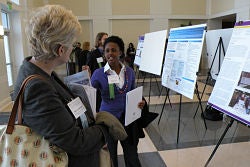Jean Mills Health Symposium marks 10 years
Jean Mills earned two college degrees, taught French and Spanish, and studied and traveled throughout the United States and abroad during her short life.
Mills, a Greenville native and J.H. Rose graduate, died at age 45 of breast cancer in 2000. She was a brilliant woman who was passed over for jobs and career advancement partly due to her weight, said her older brother, Amos Mills III.

Participants at the 2013 Jean Mills Health Symposium take a break to view posters about research into topics related to health disparities.
That type of discrimination still lingers, Mills said, along with health disparities – which led in part to the creation of the Jean Mills Health Symposium 10 years ago at East Carolina University.
This year’s event will begin at 9 a.m. Friday, Feb. 7 at the East Carolina Heart Institute at ECU.
Mills and his family started the symposium as a tribute to his sister and to bring awareness and solutions for health problems such as high blood pressure, stroke, hypertension, diabetes and obesity that plague North Carolinians, particularly African-Americans and other minorities.
The symposium was designed to bring together a diverse group of community participants including faith-based organizations and community leaders with heath care providers, university faculty, students and clinicians to collaborate and share knowledge, ideas and solutions to the region’s health disparities.
“This is the only minority rural health care symposium of its kind in eastern North Carolina,” said Dr. Stephen Thomas, dean of the ECU College of Allied Health Sciences. “The opportunity for participants to hear and interact with knowledgeable and experienced presenters and to network with others who share similar concerns and who seek permanent solutions together offers hope and direction for better health and quality of life to rural residents seeking health equity.”
This year’s symposium, “Navigating Health Equity in the Next Decade,” will focus on the impact of health care reform on rural health, the use of mobile clinics to address expanding populations such as veterans, the importance of grass roots organizations like AMEXCAN in addressing health disparities in the Mexican and Latino community and the role of school nurses in increasing health equity.
The keynote speaker is Dr. Lori Carter-Edwards, the deputy director for research and operations at the UNC Center for Health Promotion and Disease Prevention and research associate professor of health behavior at the UNC Gillings School of Global Public Health.
“We have a lot of work still ahead of us, relative to enhancing the quality of life of eastern North Carolina’s residents,” said Dr. Donald Ensley, professor emeritus in the former Department of Community Health who taught Jean Mills when she was a graduate student at ECU.
Ensley – who worked with Amos Mills to start the symposium – was a good friend of the siblings’ late parents, Amos T. Mills Jr. and Christine Payton Mills, both longtime educators in Pitt County Schools.
While the symposium has helped lead improvements in eastern North Carolina’s health status, it’s imperative that ECU and the region’s medical and health systems integrate the symposium into its teaching and care efforts and communicate, share and translate research and other findings for area citizens, Ensley said.
“There’s a saying ‘it’s easier to bend a young tree than an old tree,’” Amos Mills said, so it’s important to reach and teach young people about good health. “We don’t want to have more people dying so young.”
While the symposium has grown each year – from 50 participants its first year to about 175 in 2013 – organizers want to grow it far beyond Pitt County. Future topics will examine income equity, the income gap and its relation to health, climate warming, joblessness, educational changes and impacts on career. “All of these and more is a direct correlation with one’s health and the quality of one’s life,” Ensley said.
Mills was eight years older than his sister, Jean, who came through the public school system after integration. She seized every opportunity, playing clarinet in the high school marching band and at the University of North Carolina at Chapel Hill, where she earned her bachelor’s degree with a double major in English and Spanish in 1977. She graduated in 1984 with a master’s in public administration with a concentration in community health from ECU. She was the first ECU graduate to earn a Presidential Management Intern Program scholarship, which she completed in Washington, D.C., Mills said.
“One thing she used to say is ‘you have to think not inside the box, but outside the box,’” said Mills, an attorney from Fuquay-Varina. “My sister was very strong and very open-minded. She never got her just promotions, but she didn’t let it stop her.”
For a full schedule of events or to register, visit https://www.ecu.edu/cs-dhs/ah/jeanmills.cfm